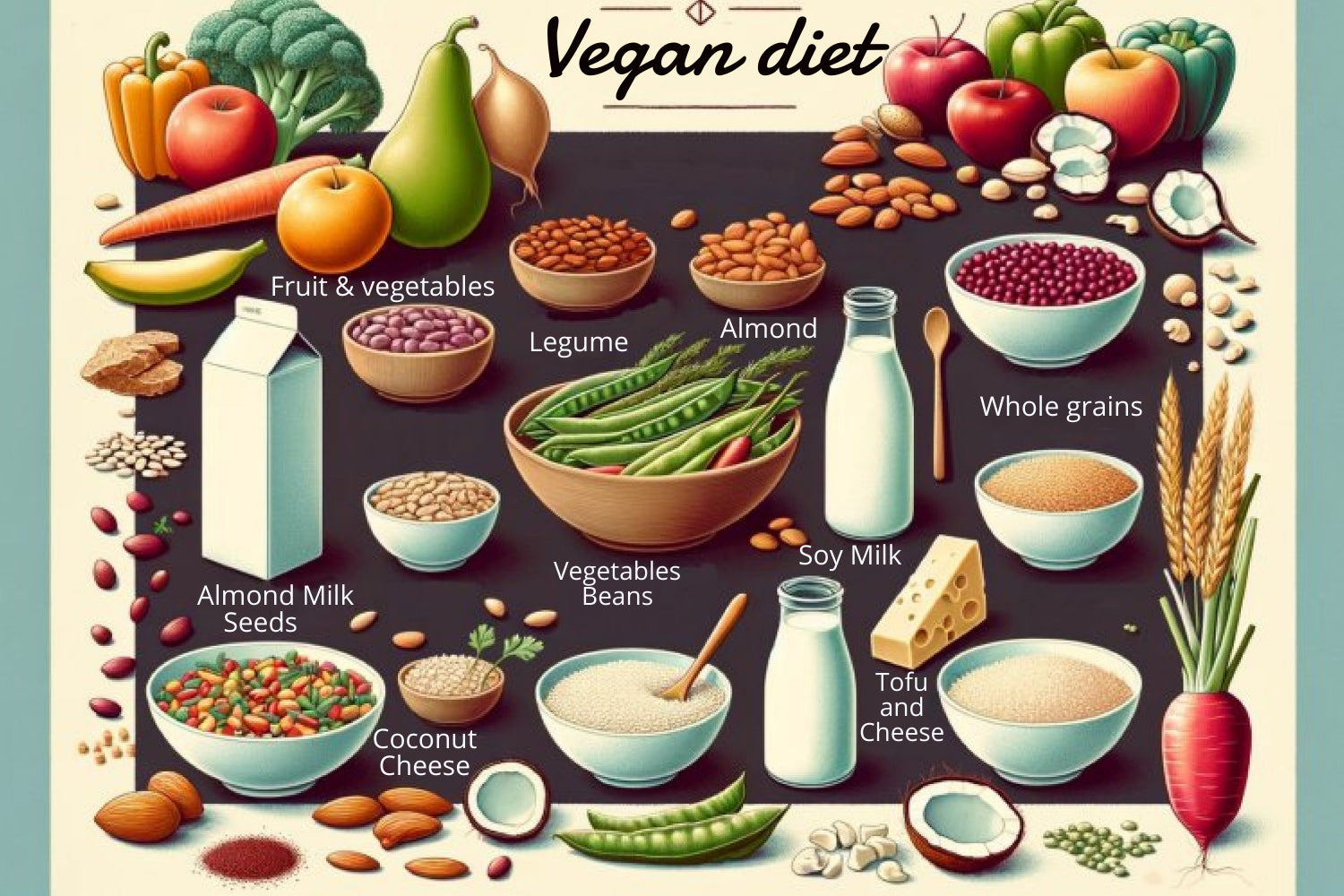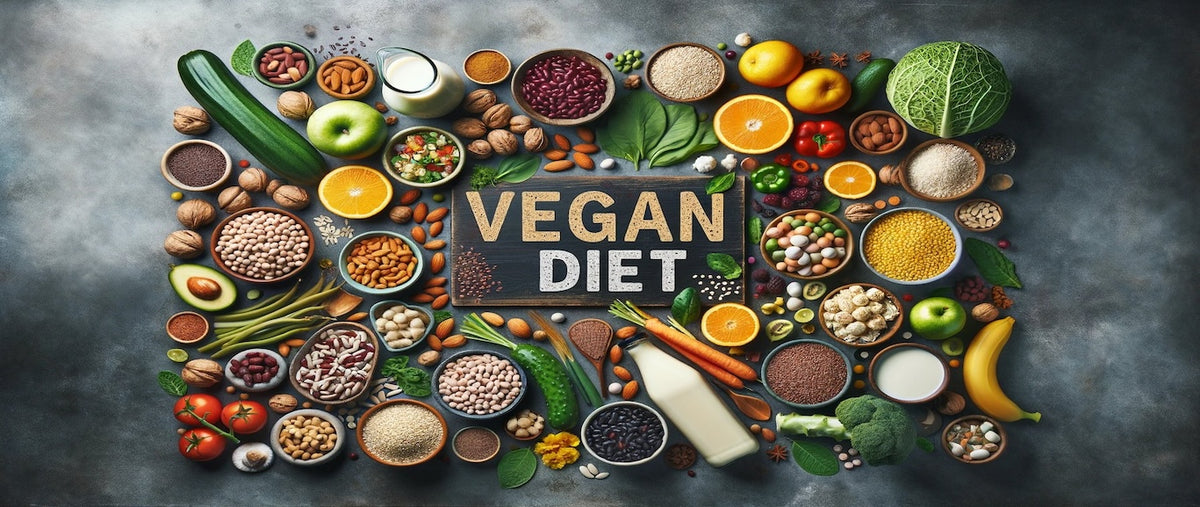The Ultimate Guide for Vegan Diet: Health Benefits, Nutritional
Introduction to Veganism
Veganism: a term that has gained significant traction in recent years, yet its roots trace back to centuries of history. At its core, veganism is more than just a dietary choice; it's a lifestyle commitment to eschew all forms of animal products, be it in diet, clothing, or other aspects of daily life. The inception of the term vegan in 1944 marked a pivotal moment, distinguishing it from broader vegetarian principles. This differentiation lies not just in the exclusion of meat, but in the complete avoidance of all animal-derived products including dairy, eggs, and even honey.
The motivations behind adopting a vegan diet are as varied as they are profound. For many, it's a health-conscious decision, fueled by mounting research that underscores the benefits of plant based eating patterns. Others are driven by ethical considerations, staunchly opposing the exploitation and harm of animals. Environmental concerns also play a significant role, with veganism recognized as a more sustainable and eco-friendly way of living.

What Constitutes a Vegan Diet?
Central to the vegan diet is its foundation in plant-based foods. This dietary regime is diverse and inclusive, embracing a wide array of fruits, vegetables, grains, nuts, and seeds. It is not just about removing meat; it’s a holistic approach that also excludes dairy, eggs, and any other products derived from animals.
The array of foods included in a vegan diet is vast:
- Fruits and Vegetables: Rich in vitamins, minerals, and fibers, they form the cornerstone of vegan nutrition.
- Legumes: Beans, lentils, and chickpeas are excellent sources of protein and essential nutrients.
- Nuts and Seeds: From almonds to flaxseeds, these are powerhouses of energy, healthy fats, and protein.
- Whole Grains: Quinoa, oats, and brown rice provide essential carbohydrates and fibers.
- Plant-Based Milks and Dairy Alternatives: Almond milk, soy yogurt, and coconut cheese offer the creaminess and taste without animal derivatives.
- Tofu and Tempeh: Made from soybeans, they are versatile and protein-rich staples in many vegan dishes.
Health Benefits of a Vegan Diet
The vegan diet isn't just about what you exclude but also about the healthful bounty you include. Research has consistently highlighted the multiple health benefits associated with a plant-based lifestyle. Here's a deeper look into these benefits:
Improved Heart Health:
Vegans typically have lower levels of LDL cholesterol, thanks to a diet high in fiber-rich whole foods and low in saturated fats. A lower risk of high blood pressure and heart disease often accompanies this cholesterol benefit.Better Blood Sugar Control:
Studies have shown that a vegan diet can improve blood glucose levels, making it particularly beneficial for individuals with Type 2 diabetes. The high fiber content in a vegan diet aids in slow sugar absorption, contributing to more stable blood sugar levels.Weight Management:
Transitioning to a vegan diet often results in weight loss, as plant-based diets are typically lower in calories and more nutrient-dense. This makes it easier to maintain a healthy weight without the need to restrict food intake excessively.Reduced Cancer Risk:
A diet rich in fruits, vegetables, and legumes, all staples in a vegan diet, is linked with a decreased risk of certain types of cancer, especially colorectal cancers.Bone Health:
Despite the myth that dairy is essential for strong bones, a well-planned vegan diet rich in calcium from plant sources like fortified plant milks, leafy greens, and tofu can maintain and promote bone health.Nutritional Considerations and Challenges
While a vegan diet is inherently rich in many nutrients, it requires careful planning to ensure a balance of essential nutrients typically derived from animal products. Key nutrients to focus on include:
- Vitamin B12: Crucial for nerve function and blood formation, B12 is predominantly found in animal products. Vegans should look to fortified foods or supplements to meet their B12 needs.
- Iron: Plant-based iron is less readily absorbed by the body compared to heme iron from animal sources. Vegans should aim to consume iron-rich foods like leafy greens and legumes, ideally paired with vitamin C-rich foods to enhance absorption.
- Calcium: Essential for bone health, calcium can be found in fortified plant milks, leafy greens, and tofu. Attention to vitamin D intake, necessary for calcium absorption, is also crucial.
- Omega-3 Fatty Acids: Essential for heart and brain health, ALA (a type of Omega-3) can be sourced from flaxseeds, chia seeds, and walnuts. However, EPA and DHA, typically found in fish, may require supplementation through algae-based sources.
- Protein: Contrary to common misconceptions, a vegan diet can provide ample protein through legumes, nuts, seeds, and whole grains.
Vegan Diet for Special Populations
Adopting a vegan diet requires thoughtful consideration, especially for specific groups with unique nutritional needs:
- Pregnant and Breastfeeding Women: A well-planned vegan diet can support a healthy pregnancy and breastfeeding period. It's vital to focus on adequate intake of vitamin B12, iron, calcium, and omega-3 fatty acids, either through diet or supplements, to support fetal development and maternal health.
- Children and Adolescents: Growing bodies need a variety of nutrients. A balanced vegan diet can provide children and teenagers with everything they need for healthy development, as long as it includes a wide range of whole foods and possibly supplements for nutrients like B12 and iron.
- Athletes: Vegan athletes can maintain peak performance with a diet that includes sufficient calories, proteins (from sources like legumes, tofu, and tempeh), and carbohydrates, along with proper hydration. Attention to iron, calcium, and vitamin D is also essential to support muscle function and recovery.
Practical Tips for Adopting a Vegan Diet
Transitioning to a vegan diet can be a significant lifestyle change. Here are some practical tips to make the switch smoother:
Start Gradually:
Begin by incorporating more plant based foods into your diet before completely eliminating animal products.Plan Your Meals:
Ensure you're getting a variety of foods to meet your nutritional needs. Meal planning can help avoid last-minute compromises.Read Labels:
Be vigilant about hidden animal-derived ingredients in packaged foods.Learn to Cook New Recipes:
Explore vegan recipes and cooking methods to keep your meals exciting and nutritious.Seek Support:
Join vegan communities or forums for support, recipe sharing, and tips.Supplement Wisely
Consult with a healthcare provider to determine if you need any supplements, especially for nutrients like B12, vitamin D, and omega-3 fatty acids.

Common Myths and Misconceptions About Veganism
When it comes to the vegan diet, misinformation abounds. Let's tackle and dispel some of these widespread myths:
-
Myth: Vegans Don't Get Enough Protein
Reality: Protein is abundant in the plant kingdom. Legumes like lentils, chickpeas, and black beans, soy products like tofu and tempeh, and a variety of nuts and seeds are all rich in protein. Quinoa, a complete protein source, contains all nine essential amino acids. Vegan athletes often supplement their protein intake with plant-based protein powders.
-
Myth: Vegan Diets Are Automatically Healthy
Reality: The healthfulness of a vegan diet hinges on food choices. Consuming processed vegan foods high in sugar and saturated fats can be detrimental. A focus on whole foods, including a variety of fruits, vegetables, whole grains, and proteins, is crucial for a balanced diet.
-
Myth: Vegans Are Always Hungry
Reality: A well-structured vegan diet is rich in fiber, which promotes satiety and aids in digestion. Foods like oatmeal, sweet potatoes, and avocado are not only nutritious but also filling. Regular consumption of a diverse range of foods ensures that hunger is not more prevalent than in non-vegan diets.
-
Myth: Vegan Food is Boring
Reality: The world of vegan cuisine is vast and varied, exploding with flavors and textures. From exotic fruit smoothies and hearty vegetable stews to creative tofu scrambles and vibrant salads, the options are endless. Many international cuisines, like Indian, Middle Eastern, and East Asian, offer a plethora of naturally vegan dishes.
-
Myth: Vegans Can't Build Muscle
Reality: Numerous vegan athletes and bodybuilders have debunked this myth. Building muscle on a vegan diet involves consuming adequate plant-based proteins and maintaining an appropriate exercise regimen. Foods like lentils, chickpeas, tofu, and seitan, along with mindful workout plans, support muscle growth and strength.
-
Myth: Veganism Is Expensive
Reality: While specialty vegan items can be costly, the staples of a vegan diet – grains, beans, legumes, fruits, and vegetables – are some of the most affordable foods available. Bulk purchasing and seasonal shopping further reduce costs. Growing your own vegetables and herbs can also be a cost-effective and rewarding approach.
-
Myth: Vegans Lack Energy
Reality: When properly planned, a vegan diet can be rich in iron, vitamins, and carbohydrates, all of which are vital for energy. Incorporating a variety of whole grains, nuts, seeds, and leafy greens ensures a steady supply of energy throughout the day.
-
Myth: Vegan Diets Are Deficient in Nutrients
Reality: While there are key nutrients to be mindful of, such as vitamin B12, iron, and omega-3 fatty acids, a well-planned vegan diet can provide all necessary nutrients. Supplements and fortified foods can fill any gaps, making nutrient deficiencies no more common than in non-vegan diets.
-
Myth: Veganism Is Just a Diet
Reality: Veganism extends beyond dietary choices. It's a lifestyle that encompasses a philosophy of reducing harm to animals and the environment. Many vegans also choose cruelty-free clothing, cosmetics, and household products.

Conclusion
Embracing a vegan diet is a journey that extends beyond just food choices. It's a lifestyle that advocates for health, ethical, and environmental benefits. By debunking common myths, understanding nutritional needs, and adopting practical tips for a balanced diet, anyone can embark on this fulfilling journey with confidence.
As the world becomes more aware of the impact of dietary choices, the vegan diet stands out as a sustainable, ethical, and healthful option. Whether motivated by personal health, animal welfare, or environmental concerns, a vegan diet offers a way to align one's actions with one's values, all while enjoying a diverse and delicious array of foods.
With careful planning and a mindful approach, the vegan diet can meet the nutritional needs of individuals in all stages of life, proving that a diet free from animal products is not only viable but also beneficial for both people and the planet.








